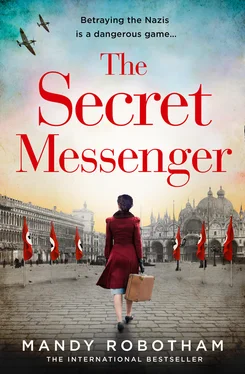1 ...7 8 9 11 12 13 ...17 The work is challenging, mostly due to the technical nature of the translations. But it’s their complexity, I’m told, which is helping the Resistance understand German movements, and, more importantly, their thinking too. My reports and the scraps from my shoes are passed promptly via a chain of Staffettas – a whole army of largely female Resistance workers, like me, used to move vital messages across Italian cities and towns. They are passed to the underground offices of the Resistance, vital information that helps to thwart Nazi efficiency in occupying our city. In office hours, I am responsible for gleaning that critical information directly from Breugal’s reports and passing it on to my fellow Staffettas, organised in a network between each of the partisan battalions in Venice. Once I step out of the office, though, I become one of that army – those who slip nonchalantly into bars with girlfriends, chatting in groups, who might slide a message under the table or pass notes via a waiter in the know. A whole other band of mothers and older women are employed in the same task, secreting written missives in baby carriages, nappies and shopping bags, innocently sailing through the checkpoints set up around the city. It’s merely a piece of paper, but the consequences of discovery by Nazi or fascist patrols are grave – at times, deadly. It’s war work and we are all soldiers in some way.
Some evenings, I will stop for a coffee in Paolo’s café, other times at a string of bars in the Castello or San Polo districts, sharing a drink and deep conversation with women I barely know as though we are best friends, looking as if there isn’t a war on. As we embrace goodbye, each of us slips the other a piece of paperweight contraband, and we say ‘ Ciao ’ with smiles and waves. I move on to my delivery destination, and she to hers, while the Nazi officers who are sometimes in our midst carry on, none the wiser. It makes my stomach flip with fear as I move away, then do somersaults of triumph when I round the corner with no patrol on my tail. I realise sometimes I actually enjoy the excitement, and it makes me think of Popsa and his defiant streak.
The pretence, however, is exhausting. I seesaw between the persona of a flighty office girl, with the daily demands on my memory for such detail, and the physical role of a Staffetta – the time and energy spent zigzagging across Venice on foot to pass messages and parcels along. What with visits to the partisan newspaper cellar at least twice a week, it means I barely see my own friends. Trips home to Mama and Papa’s house, the home where I grew up in the streets around the Via Garibaldi, are once a week at best. It’s not enough, but it’s all I can manage with my double – no, triple – life.
‘You’re getting thin,’ is Mama’s familiar refrain as I arrive unexpectedly at her door one evening. She would be within her rights to make a flippant remark about my gracing them with my presence, but her mother’s love stops her. I don’t tell her I’ve made a message drop just two streets away, and that familiar guilt gnaws at my stomach. It’s only manageable when I think of the greater good – bringing back the Venice that belongs to hard workers, honest people like my parents.
‘How’s work?’ she asks, as she serves polenta on my plate, along with the lion’s share of a thin mixed-fish stew, which needs to be stretched after my arrival.
‘It’s fine,’ I lie. ‘Lots of activity in keeping the water supplies coming in from the mainland.’ I haven’t told them of my move to Nazi headquarters, and I don’t plan to yet – Mama worries enough. While both are confirmed partisans, sharing anti-fascist beliefs and willing to help the cause, they are not active in the way I am. Out of the corner of my eye, though, I note a twitch to Papa’s normally calm face. He swipes his eyes away as I flick mine towards him.
‘Stella, you should move back home again,’ Mama goes on, in her unending plea. ‘We could manage the household much better, and we would know you are safe. I worry about you so much. It seems as though Vito is never here either. You shouldn’t be on your own.’
As with every visit, I say, ‘But Mama …’ trying to justify my need for independence. She doesn’t need to know how much she would worry at my trips across Venice, sometimes on a boat to the Lido or the mainland under cover of darkness, wherever the message takes me. Her ignorance is bliss, although she doesn’t know it.
Papa walks out into the yard as I’m taking out the rubbish. I know enough of undercover work now to sense the cigarette he is lighting is simply a ploy, but I don’t stop what I’m doing. He draws hard and the scent catches in my nostrils, his plume of smoke a sheet of white in the cold December air. Finally he speaks.
‘So how is it working in the wolf’s lair?’ He looks directly at me as I spin round. I say nothing, but my own stare doesn’t deny it.
‘What did you expect, Stella? I work in the docks – there are ears and eyes everywhere. I hear things. And people know you, care about you, enough to tell me.’
Even so, I’m shocked that the news has travelled, like a baton in a relay race, to my father. But then this war is all about information and gossip. And isn’t that what I trade in, every day? ‘Just don’t tell Mama – please,’ I entreat. ‘She’ll only worry. You know she’s already suspicious about Vito.’
I, and perhaps Papa, know about my younger brother’s place in the Resistance brigade. Coupled with his sometimes reckless pursuit for adventure, it would send Mama into a spin if she knew for sure that both her children were courting danger. On the grapevine, I hear of Vito’s hunger for ‘doing his duty’ as a partisan and it makes me nervous; I’ve heard his name mentioned more than once in plans to derail troop-carrying trains into Venice, or scupper German supply boats – plans that involved explosives. Sometimes I wish my hearing wasn’t so acute.
‘Do you know anything about Vito?’ Papa asks anxiously. Seeing my strained look, he adds: ‘Please, Stella – look, I know he’s in the brigade. I can’t stop him doing it, but I just want to know he’s safe. He disappears for days at a time.’
‘Papa, I’m in a different battalion,’ I sigh, and he knows what I’m saying. Either I won’t or I can’t talk about it. It’s a mixture of both. He slumps back against the brick wall, draws on his cigarette again. The pause is leaden.
‘So, how did you get the job in the Reich office?’ Papa asks at last, if only to break the impasse. ‘Was it Sergio who managed to place you?’ His natural protectiveness towards his only daughter brings an edge to his voice, an unspoken suspicion that my own commander would willingly put me in harm’s way.
‘No,’ I say truthfully. ‘It wasn’t really a choice. I was simply seconded by the Reich department, because I speak decent German.’
‘Ah, the benefits of a good high school education.’ He half laughs, but without humour.
‘It’s just a job, Papa,’ I say, looking at the night sky so I don’t have to meet his accusing eye.
‘And I’m an Italian who hates pasta,’ he says, a smirk beginning to curl his lip. Now he stubs out his cigarette and faces me, grasping my arms with both hands. ‘Just be careful, my love. I know you’re far smarter than you probably let them believe, but I also know you have too much of my father in you. And that’s the bit that worries me. These are dangerous people.’
‘The Nazis or the fascists?’
‘Both,’ he says resolutely.
I shrug, trying to make light of it, to protect him as much as Mama. ‘I will be careful, Papa, I promise. Listen, I want to be around to see the Venice of old return. I want to preserve us as much as anyone else. That’s why I need to work there.’ I kiss his cheek, and make to go back inside. ‘Didn’t you know, I’m a good Italian girl, who adores our beloved Benito?’
Читать дальше












